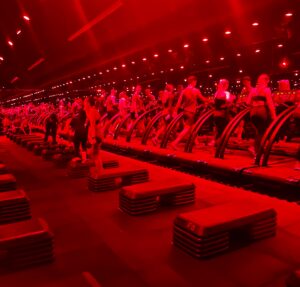Many New Year’s resolutions involve quitting. Quitting drinking, quitting smoking, quitting sugar, Or starting some big challenge – mainly involving working out. We see the gyms and workout studios fill up with determined people who may have been in a holiday cookie blur but could be mistaken for ironman training competitors. So hardcore and leaving no space on cardio machines, workout classes and you can forget the bench press. You may go to a yoga class and experience namaste or a foot in your face.
The hard and simple truth: You can’t outrun, outdance, outkickbox, or outnamaste a bad diet. And I am looking to partially prove that and some other things by my 2023 New Year’s Resolution.
Watch my short on this!
Which leads me to my New Year’s resolution. I have always wanted to do this when the January resolution rush happens and now I finally have an accountable audience. I am going to stop working out for the ENTIRE month of January. So yes, it’s the “opposite” strategy of George Costanza – for those who may not remember here’s a reminder.
So why did George actually start an opposite strategy (that is now recognized as a way to win friends and influence people)? What some might observe is that what he was doing as his natural instinct just wasn’t working. This radical disruption in his life yielded unexpected results.
Why Stop Working Out?
So this is why I am pushing the brakes on my workouts, and some factors for you to conisder if you are in the same boat.
- Plateuing. I do not really see any significant results even when I change up my routine, do more cardio or less cardio, do pilates, do more HIIT, do more LISS, or more yoga or dance. Nor have I seen change from doing two-a-days, working out in the morning or the evening only, working out in the middle of the day, intermittent fasting before my workout, eating before and after my workout, eating more protein, eating less protein, eating more carbs or going low carb.
- Not as psyched for workouts. No, I don’t hate it, but sometimes it really feels like an obligation. I procrastinate going to the gym and I find myself needing to caffeinate heavily including with a drink like Redbull or BANG just to get that extra will to go.
- Always, always HUNGRY. I have lost my connection with my true satiety and hunger signals because tough workouts on top of my really busy work schedule have made me constantly think of food 24/7. Once I eat I wonder when I will have my next meal. My cravings for straight sugar and candy have increased, also. As a result, I tend to overeat past the feeling of being full at meals.
- Less energy. Working out is supposed to give you MORE energy, but too much of it backfires. My energy, though normally really high, has been low lately. I really felt it over this holiday season when I completely broke down in exhaustion. Even with more sleep, the tiredness is getting better but it’s still really noticeable.
- Feeling puffy or clothes tighting. No matter what I have eaten or what else is going on in my body. What do I mean by that? Especially after a workout, pants that normally fit feel snug and hard to pull up or jackets don’t button as easily. Which SUCKS when you wear businessy clothes.

Overtraining is a real possibility for Type A People
All of these are classic symptoms of exercise overtraining, which this article in WebMD explains really well. Many of these symptoms are caused by a vicious cycle of “more is better” – you work out, you see great results, you work out even more, then you work out more because you feel like you have to maintain the cadence of what you started, and then it’s just digging a bigger and bigger hole.
Common Symptoms of Overtraining:
- Decreased athletic performance
- Fatigue
- Elevated heart rate
- Muscle and joint pain
- Blood pressure changes
- Sleep disturbances with or without night sweats
- Loss of appetite
- Thirst
- Increased susceptibility to and severity of illness, colds, and allergies
- Flu-like symptoms
- Swollen glands
- Gastrointestinal disturbances
- Depression
- General apathy
- Irritability
- Inability to concentrate
- Decreased libido
- Increased sensitivity to environmental and emotional stress
If any of these apply to you, taking a break is something to consider. I am going on this one-month journey mainly because I wan to see what will happen, but it has to be something you decide for yourself and most preferably with consulting a health professional.
Taking a Break Does Not Mean Standing Still
So does “not exercising” mean I am going to sit on the couch? Nope. I will continue to take my walks, both the 2 miles round trip to the office on days I go in and short walks less than 30 minutes on the days I work from home. I will take the stairs and try to stay active but there is NO step goal (and I don’t even have a fitbit). If I don’t feel like walking or feel tired, then I will rest. And, I will stretch and foam roll in front of the TV, but not according to a “program.”
As far as diet goes, I don’t intend to change anything about what I am doing. I am not going to follow any kind of fasting or eating window. I will eat when I feel hungry – if that’s at 8am, ok, but if it’s not until 11 or 12, also ok. I really hope out of this I can really reconnect with the rhythm of my hunger signals and nutrition needs and then actually understand what macros I need for my everyday life instead of some arbitrary percentage targeted at certain results.
What’s Next
Follow my vLOG on DAOFitLife Youtube Channel to see my journey and I will write an update after two weeks with progress photos.
Research sources:
- Overtrain if you don’t want to gain! (Bodybuilding)
- What to know about overtraining (WebMD)
- Are you overtraining? (Kbfitbrit)






